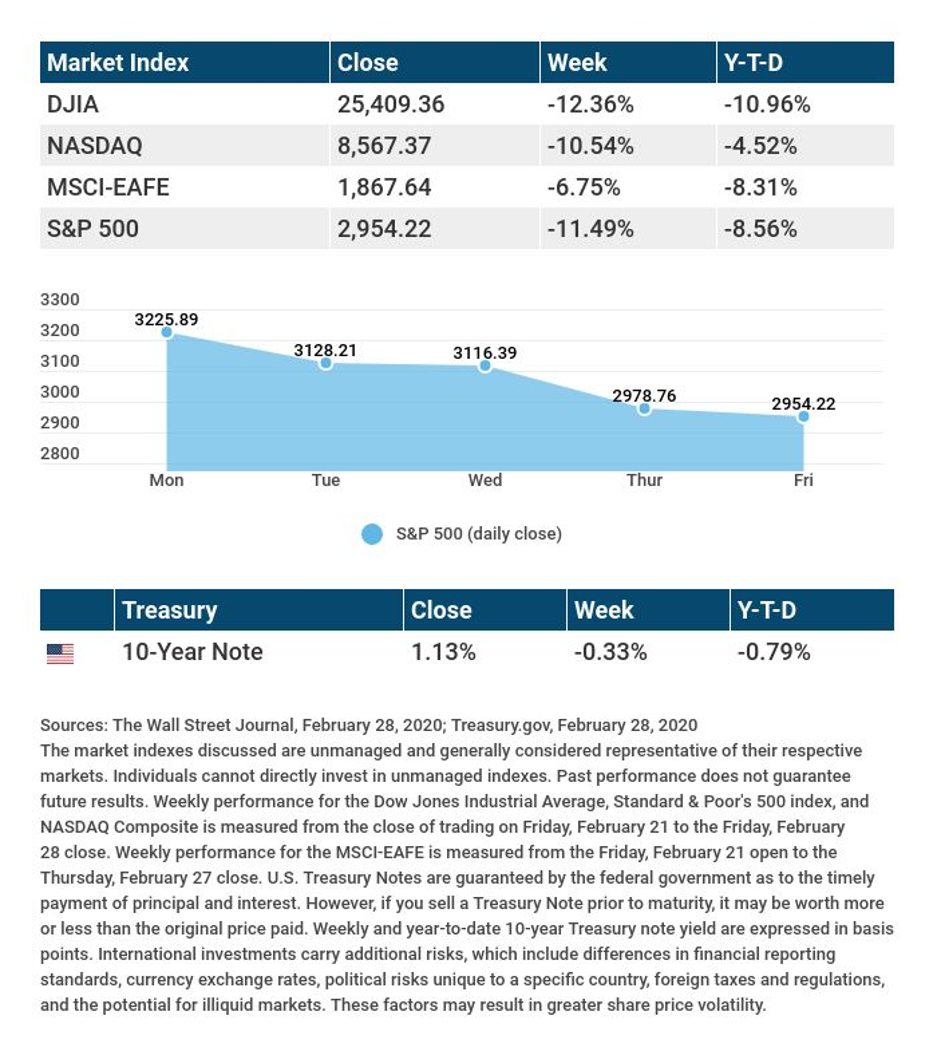The Week on Wall Street
Stocks fell sharply last week as Wall Street considered how the coronavirus outbreak might influence global business activity and household spending.
The selloff became a correction for the U.S. markets. The S&P 500 retreated 11.49%; the Dow Jones Industrial Average, 12.36%; the Nasdaq Composite, 10.54%. The MSCI EAFE, tracking developed stock markets outside North America, had fallen 6.75% week-over-week by Friday’s closing bell.
On Friday afternoon, Federal Reserve Chair Jerome Powell stated that central bank officials were willing to “use our tools and act as appropriate to support the economy.”[1][2][3]
Strong Consumer Confidence, Plus a Boost for Incomes
A trio of economic indicators pertaining to U.S. households looked solid last week. The Conference Board’s Consumer Confidence Index notched consecutive months above 130 for the first time since July-August 2019, posting a 130.7 February mark. The University of Michigan’s final February Consumer Sentiment Index came in at 101.0, ticking up from a preliminary 100.9.
Friday, the Department of Commerce reported that Americans increased their personal spending by 0.2% in January, while personal incomes improved 0.6%.[4][5]
Buyers Have Flocked to New Homes
New home sales, according to the Census Bureau, improved 7.9% in January; the annualized pace of new home buying was the best seen since July 2007. Year-over-year, sales were up 18.6%. Housing market analysts cited a favorable economy and favorable weather as factors.[6]
Final Thought
Right now, there is no forecast for how the coronavirus outbreak may affect consumer demand or supply chains. The impact may not be known for months. But remember, your investment strategy should reflect your risk tolerance, time horizon, and goals, and it also should take into consideration periods of market volatility. Fear is driving decisions in the financial markets. Nobody would blame you if this uncertainty gave you a bit of anxiety as well.
THE WEEK AHEAD: KEY ECONOMIC DATA
Monday: The Institute for Supply Management’s latest factory activity index arrives.
Wednesday: Automatic Data Processing (ADP) publishes its February private payrolls report, and ISM’s index of February service-sector business activity appears.
Friday: The Department of Labor presents its February employment report.
Source: MarketWatch, February 28, 2020
The MarketWatch economic calendar lists upcoming U.S. economic data releases (including key economic indicators), Federal Reserve policy meetings, and speaking engagements of Federal Reserve officials. The content is developed from sources believed to be providing accurate information. The forecasts or forward-looking statements are based on assumptions and may not materialize. The forecasts also are subject to revision.
THE WEEK AHEAD: COMPANIES REPORTING EARNINGS
Tuesday: AutoZone (AZO), Ross Stores (ROST), Target (TGT)
Thursday: Costco (COST), Kroger (KR)
Source: Zacks, February 28, 2020
Companies mentioned are for informational purposes only. It should not be considered a solicitation for the purchase or sale of the securities. Any investment should be consistent with your objectives, time frame and risk tolerance. The return and principal value of investments will fluctuate as market conditions change. When sold, investments may be worth more or less than their original cost. Companies may reschedule when they report earnings without notice.

Investing involves risk including the potential loss of principal. No investment strategy can guarantee a profit or protect against loss in periods of declining values.
Diversification does not guarantee profit nor is it guaranteed to protect assets.
International investing involves special risks such as currency fluctuation and political instability and may not be suitable for all investors.
The Standard & Poor’s 500 (S&P 500) is an unmanaged group of securities considered to be representative of the stock market in general.
The Dow Jones Industrial Average is a price-weighted average of 30 significant stocks traded on the New York Stock Exchange and the NASDAQ. The DJIA was invented by Charles Dow back in 1896.
The Nasdaq Composite is an index of the common stocks and similar securities listed on the NASDAQ stock market and is considered a broad indicator of the performance of stocks of technology companies and growth companies.
The MSCI EAFE Index was created by Morgan Stanley Capital International (MSCI) that serves as a benchmark of the performance in major international equity markets as represented by 21 major MSCI indices from Europe, Australia, and Southeast Asia.
The 10-year Treasury Note represents debt owed by the United States Treasury to the public. Since the U.S. Government is seen as a risk-free borrower, investors use the 10-year Treasury Note as a benchmark for the long-term bond market.
Opinions expressed are subject to change without notice and are not intended as investment advice or to predict future performance.
Past performance does not guarantee future results.
You cannot invest directly in an index.
Consult your financial professional before making any investment decision.
Fixed income investments are subject to various risks including changes in interest rates, credit quality, inflation risk, market valuations, prepayments, corporate events, tax ramifications and other factors.
These are the views of Platinum Advisor Strategies, LLC, and not necessarily those of the named representative, Broker dealer or Investment Advisor and should not be construed as investment advice. Neither the named representative nor the named Broker dealer or Investment Advisor gives tax or legal advice. All information is believed to be from reliable sources; however, we make no representation as to its completeness or accuracy. Please consult your financial advisor for further information.
By clicking on these links, you will leave our server, as the links are located on another server. We have not independently verified the information available through this link. The link is provided to you as a matter of interest. Please click on the links below to leave and proceed to the selected site.

